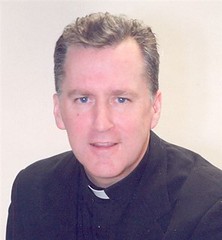The Origin of Silent Night - A Christmas Carol is Born
by Fr. Bernard Heffernan
For 22 years I looked after the spiritual needs of senior citizen homes. Volunteers helped. Among them was Anna Cairnduf, a lady who hails from a mountain town in Austria. She's the grand niece of Father Joseph Mohr, the writer of the Christmas carol "Silent Night" which for a long time was ignored. Why?
Great music is expected from great cities and great Cathedrals but hardly from a poor, cold, drafty little mountain church, where a few days before Christmas in 1818, a hungry mouse chewed through the bellows of the old organ, silencing it. Oh no! No music for Christmas.
Nothing good was expected from the mountains and less was expected from pathetic Father Mohr. He was not a bright light in the diocese. He would never make a monsignor, hardly even a pastor. The bishop sent him into the mountains to help a stern old pastor, who at the sight of his new helper became even sterner.
At the church, the day before Christmas Eve, organist Franz Gruber arrived and discovered the damaged organ. Exasperated, he pressed the keys and pumped the bellows. Not a sound! He and Father Mohr pondered, "What could be done to save Christmas?" Shyly the priest withdrew from his pocket a paper and showed him the words he had scrawled in German, "Silent Night, Holy night. All is calm. All is bright. Round yon virgin mother and child. Holy infant so tender and mild. Sleep in Heavenly Peace!"
Franz Gruber was captivated by the simplicity of the song, that told so well the wondrous story. Hastening home he fingered his violin and wrote the music so he and Father Mohr could harmonize.
Come midnight Mass, the arriving parishioners and lumber jacks, trudging through the snow, were disappointed when they heard there was no organ. No music! Sterner than usual the pastor began the Mass and delivered his Christmas sermon.
Then to everyone's surprise at the front of Church, appeared six children in colourful dress and bright red bows, flanked by Father Mohr and Franz Gruber playing his violin.
There in that little church in the mountains was heard the world premier of "Silent Night." The surprised parishioners didn't know what to think. But one glance at the angry pastor told them. After Church the departing faithful quickly bid Christmas wishes and "Good Night". No one mentioned the song. One polite lady said the children's clothes were pretty. That was all.
Perhaps the performance of Silent Night was the last straw, causing the pastor to complain to the Bishop. Whatever! By the time the snow had gone and Spring had come, and the organ repair man arrived with horse and cart, Father Mohr had long vanished like a log round the bend of the river.
Up in the choir loft, the organ man found the scrap of paper on which was written "Silent Night". He carried it out of the mountains to the world, to its cathedrals, music halls and palaces. Authorship was attributed to famous composers like Bach and Beethoven. Only later did the world learn of the humble authors.
Now all the names of other Austrian Priests and organists of the time have vanished. But the names of Father Joseph Mohr and organist Franz Gruber live on in a museum built in their honour and in the beautiful Christmas song, sung in 200 languages every Christmas around the world - "Silent Night"
In their Austrian homeland, in the 1800's on Christmas Eve, when lumberjacks were gathering and `Stille Nachte' rang out through the Alpine mountains, here in Canada through forested, snow covered hills, across frozen lakes, lumberjacks also strode to church, summoned by the bells, organs and the beautiful Christmas carol, "Silent Night".
http://www.lifesite.net/ldn/2005/dec/05122002.html
Friday, December 30, 2005
Subscribe to:
Post Comments (Atom)

No comments:
Post a Comment